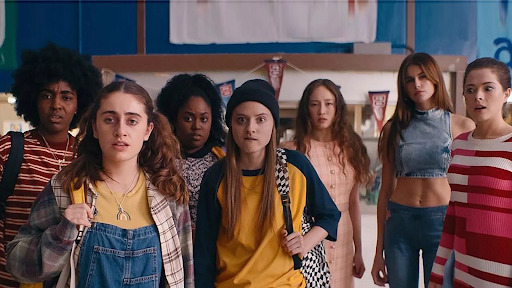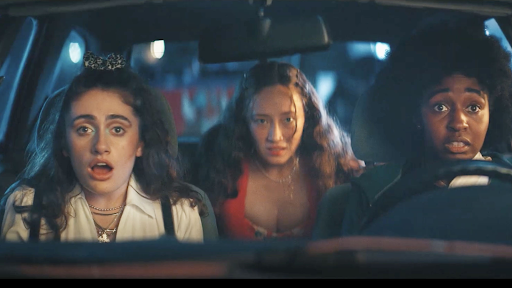The noble pursuit of pussy separating two young friends, and eventually bringing them back together, is by no means a new teen movie formula, but BOTTOMS charts new territory by making the protagonists lesbians instead of straight guys. Lesbians might have been bullied for being lesbians in the teen movies of the past, but PJ (Rachel Sennott) and Josie (Ayo Edebiri) aren’t losers because they’re gay, they’re losers “because they’re gay and untalented.”
Much like their male predecessors, it never occurs to PJ and Josie that if they were to invest in themselves, the pussy will follow. Instead, they don’t talk about much except getting pussy. PJ is the more confident one, while Josie is shyer and more considerate of others. Their main goal in life is to bag hot cheerleaders: Josie has her sights set on Isabel (Havana Rose Liu), who of course is dating the hot football star Jeff. (Is Nicholas Galitzine a straight actor playing gay or a gay actor playing straight? I’m not sure.) In stereotypical jock fashion, Jeff has “cheater” written all over him from the start. PJ is interested in Isabel’s codependent best friend Brittany (Kaia Gerber, Gen Z’s Alexandra Daddario with smaller tits).
The beauty queens never give bottom feeders the time of day; that is, until a rumor is started that PJ and Josie went to juvie over the summer. The rumor is started by Hazel (Ruby Cruz), who innocently misunderstands one of PJ’s many sardonic remarks, and spreads the word more out of admiration than malice. Hazel is an outcast too unpopular for even Josie and PJ to associate themselves with, although it’s never quite clear why that is. Ruby Cruz maintains her kind eyes while bringing so much confidence and verve to the role of Hazel, often stealing the show.

The juvie rumor, combined with a lame excuse made to get them out of disciplinary trouble, gives PJ and Josie the chance to carve out a new place in the status quo for themselves: they start an all-girl fight club as a ruse to get into Isabel and Brittany’s pants, under the guise of boosting female solidarity at the school. At first, only the wrong kind of girls show up (“They’re all sixes… at best!” PJ groans), including Hazel, fat Black Republican Annie (Zamani Wilder), and trailer trash Sylvie (Summer Joy Campbell). But under the leadership of Mr. G (Marshawn Lynch), who needs something to take his mind off his divorce, Josie (and PJ) and their pussycats garner enough notoriety among the students to get the attention of Isabel and Brittany, who are drawn into the ideas of sisterhood and empowerment. Like most fight clubs I’d imagine, not everything goes according to plan.
Co-writers Seligman and Sennott are bright enough to not only give their protagonists negative motivations, but also the ability to be honest with themselves about their true intentions. I can easily see a lesser filmmaker writing protagonists who are dishonest with themselves, claiming feminism as their raison d’être and believe that they mean it (BOOKSMART) when in reality they have other motivations. At least in the privacy of their friendship, Josie and PJ are honest with each other and themselves about their pussy-getting aspirations.
Beyond that, inner character psychology is sacrificed for a RIVERDALE-like tone, which would work were the satire more pointed. The satire of BOTTOMS is on par with the first season of GLEE, which is darker than a lot of people give it credit for, but it’s no PINK FLAMINGOS or even CRY BABY. Am I supposed to be scared of these jocks, who are so much bigger and stronger than the girls, or are they sissies who can’t handle being tapped on the knees and sing along girlishly to “Total Eclipse of the Heart” in their bedroom? Are rape jokes funny now that they come out of Rachel Sennott’s mouth (“Who here has been raped? Gray area stuff counts too.”)? Seligman and Sennott want to have it both ways, and in this way they are less honest with themselves than Josie and PJ.

SHIVA BABY, Seligman and Sennott’s last collaboration and Seligman’s debut feature, worked so well because it was a funny, deftly handled, often stressful, intimate character study of a young woman in crisis. BOTTOMS would have gained some more universality in the specific, as the satire isn’t quite strong enough to sustain a world of caricatures. The film is not tied to a particular time period, instead drawing inspiration from teen movies past. The musical choices are meant to evoke nostalgia for teen movies of the 1980s and the 2000s, yet the characters all speak like it’s 2023. They go on diatribes about “allyship,” and make jokes about jacking off after every therapy session. Teens that talk like Josie and PJ would use smartphones, but the teens in BOTTOMS use flip phones; hellbent on exposing Josie and PJ as frauds, Jeff’s right-hand man Tim (Miles Fowler) even uses the Yellow Pages to disprove the juvie rumor. The film would have gained more credibility in my eyes if he’d just used the internet.
If we are in fact doomed to American teen movies forever being scripted by Twitter speak, I can only hope they have as many funny one-liners as BOTTOMS. In a post-screening Q&A, Seligman gave a lot of the credit to her leads Sennott and Edebri, who she described as “joke machines,” and much of BOTTOMS’ hilarity can be attributed to their clear comfort improvising together. Both Sennott and Edebiri come from the alt-comedy scene in NYC, and both enjoyed critical success this year for their roles in THE IDOL and THE BEAR, respectively. However, to my knowledge, neither of them are attracted to women. Edebiri pulls it off, but Sennott specifically rose to fame as a champion of straight women who date schlubby losers (may her Twitter account rest in peace), and that makes it difficult to see her as a box muncher. To quote my friend Nat who is actually a lesbian, “Rachel looks like she’s choking back tears every time she has to pretend to be attracted to women.”
The humor of BOTTOMS stumbles in the first act because the world isn’t quite specific enough, and the plot doesn’t hold too much water, but it’s a lot of fun once we’re along for the ride. The emotional beats are standard for a teen movie; girl yearns for girl, girl gets girl, girl loses girl and must win her back. Two best friends are torn apart because they both want pussy and are in disagreement about whether deceit or honesty is the way to get it. Once exposed, the friends are upset with each other, but must come together in the face of a foe (in this case, the opposing high school’s football team, in a head-scratching plot turn).
The violence of the third act is the real reason to see BOTTOMS; to quote my friend Michael’s Letterboxd, “even the gay guy who was snapping went silent for most of the last 45 minutes,” and that’s because of the unexpected, unadulterated amount of gore. A lot of horror filmmakers nowadays are afraid to go to the lengths Seligman goes to for a good gross-out moment in the final scene of BOTTOMS. The female rage expressed in all of the fight scenes, and especially the last scene, is palpable, and easily accessible if you’re a woman; I found myself feeling the strong urge to push people out of my way en route to the subway. Maybe we really do need a female fight club.
















Comments